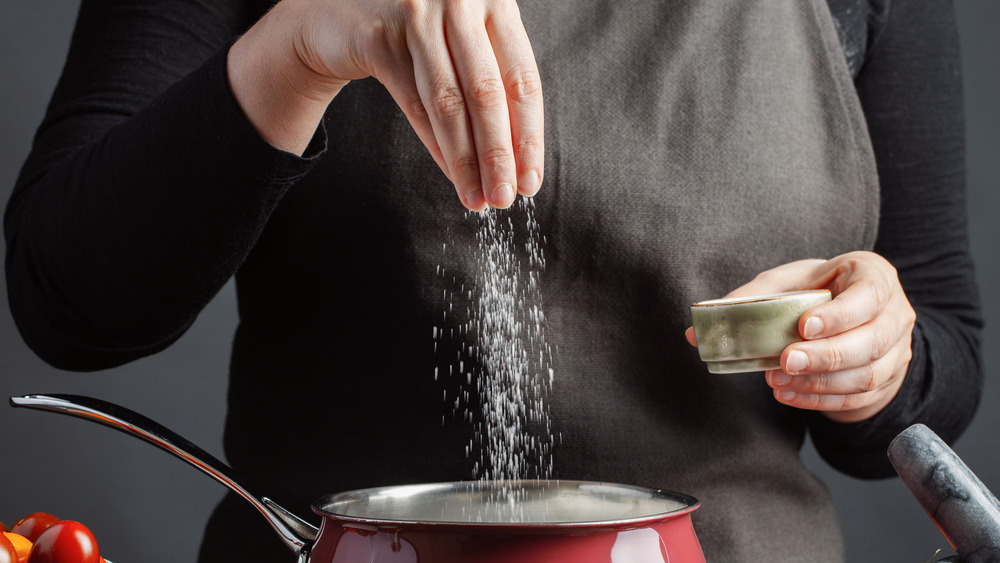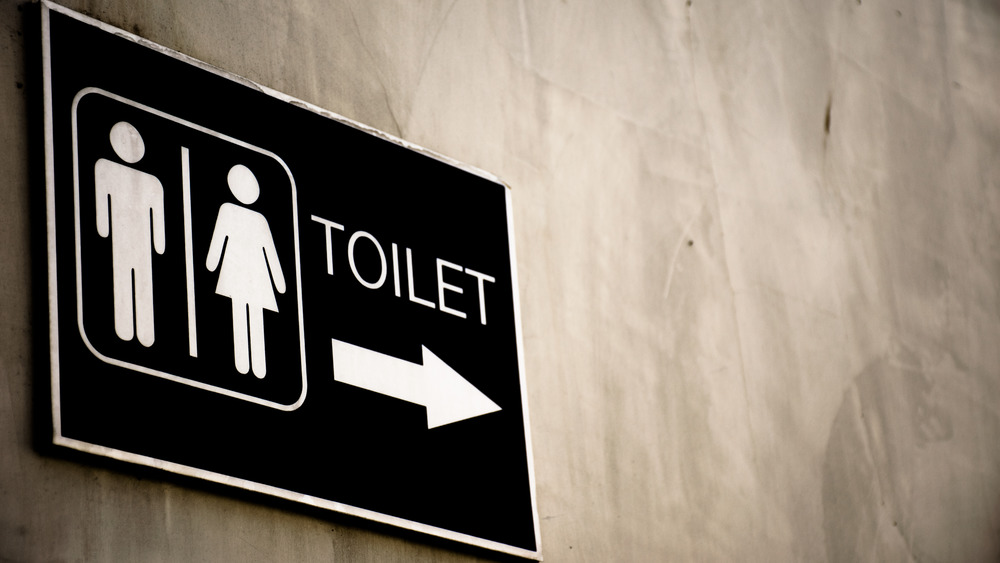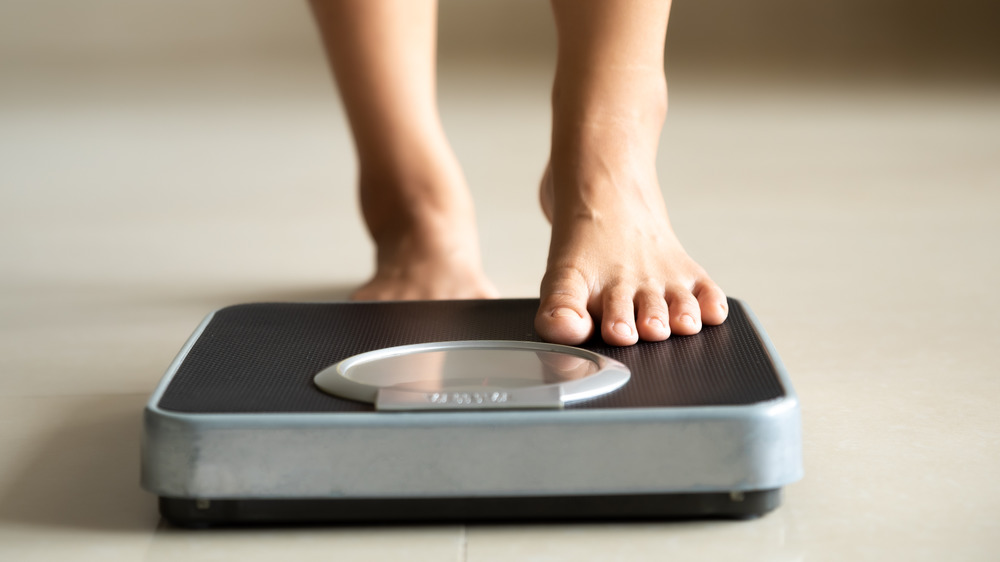You're Eating Too Much Salt If This Happens To You
A pinch of salt goes a long way. A little on the rim of a margarita glass or rubbed onto a juicy porterhouse can elevate the taste. However, Americans are using far more than a pinch. According to the American Heart Association, nine out of ten people in the United States consume too much salt on a daily basis. Yes, salt is in almost everything we eat.
While physicians suggest taking in no more than 2,300 milligrams of sodium per day, the FDA has reported that we actually consume around 3,400 mg per day on average —almost 50 percent more than is generally recommended. And most of the salt we consume comes from the packaged foods we buy. That being the case, it is possible to reduce your intake — but you'll have to shop smart.
But do you really need to reduce your salt habit? How can you find out if you're one of the nine Americans who consumes too much? Here's a look at some of the ways your body may be trying to tell you to cut back on salt.
Constantly thirsty? It's likely because you're eating too much salt
As anyone who has ever downed a bowl of popcorn knows, salt makes us thirsty. Whether you're getting your salt rush from pizza or burritos or a bag of chips, all that sodium is going to go straight into your blood, where your body will then want to balance it out—a process that requires extra fluids. "We need some salt intake each day to help maintain water balance in the body. The sodium found in salt helps keep fluid inside our cells," nutritionist Mandy Enright told Women's Health. But what happens when you eat too much salt? How does that make you thirsty?
According to registered dietitian Maggie Michalczyk "Thirst [is] your body's way of signaling to you that its fluid balance is out of whack and it needs help getting back to equilibrium." Naturally, you're going to want to quench your thirst. And remember: By the time you feel thirsty, you're already dehydrated. This is why the Mayo Clinic advises drinking water before you start to feel parched.
Too much salt can make you have to go to the bathroom more frequently
Eating too much salt changes the chemistry of your body. The reason, according to the San Francisco Chronicle, is because of a complicated relationship between salt and water levels in the body. Basically, the body wants to keep levels of both substances balanced.
When you eat a lot of salt, it winds up in your bloodstream. Your body senses it is there and pushes more water into your blood in an attempt to even things out. As this is happening, your kidneys also begin to filter extra water out of your system in the form of urine. Meaning, the more salt you eat, the more urine your body ultimately produces.
To test the relationship between salt and how frequently a person has to urinate, researchers in Japan studied a group of over 300 people, some of whom were given low sodium diets and some of whom had extra salt added to their diet. After 12 weeks, the researchers found that nighttime urination dropped by about 60 percent in the group eating less salt. For the group whose salt intake increased, nighttime urination spiked by 15 percent.
You're eating too much salt if you often feel bloated or swollen
You know that the more salt that's roaming around your bloodstream, the more water ends up there as well. A side effect of all that extra fluid? Tightness — everywhere! You may notice it in your torso in the form of bloating. Research conducted at Johns Hopkins University Bloomberg School of Public Health revealed that a high-sodium diet may increase a person's risk for feeling bloated by 27 percent (via ScienceDaily).
Extra fluid in your blood from eating too much salt can also cause swelling in your extremities, especially your hands and feet. When fluid collects there, it's called edema. "Edema is swelling caused by excess fluid trapped in your body's tissues," the Mayo Clinic explained. "Although edema can affect any part of your body, you may notice it more in your hands, arms, feet, ankles and legs."
Symptoms of salt-induced edema include swelling or puffiness, stretched or shiny skin, or skin that retains a dent after being pressed for several seconds. Whether you're dealing with bloating or edema, limiting salt in your diet can help to reduce symptoms of both conditions.
Too much salt could be the reason your food always tastes bland
Automatically reaching for the salt shaker isn't just an insult to the chef, it can also wreak havoc on your taste buds. According to a report published by the Institute of Medicine, "Salt enhances the positive sensory attributes of foods, even some otherwise unpalatable foods. It makes them 'taste' better. For people who are accustomed to high levels of salt in their food, its abrupt absence can make foods 'taste' bad."
The tongue has approximately 10,000 taste buds. These specialized cells are able to detect both the flavor and the intensity of the foods we eat, WebMD revealed. Once a flavor is detected, that information is sent to the brain. Over time, our brains begin to expect foods to present it in a certain way, explained smell and taste expert Marcia Levin Pelchat. "People like [what] they are used to," she told WebMD. "If you are used to tastes high in sugar and salt, that is what you expect." And when a food doesn't meet those expectations, it seems disappointing — or bland — to your taste buds.
If you get sick often, you may be eating too much salt
Scientists typically consider salt a bacteria killer. Its power comes from a chemical reaction called osmosis, a balancing process in which molecules in the body try to balance levels of sodium on both sides of their membrane walls, causing your system to retain extra fluids (via Encyclopedia Britannica). Normally, when bacteria enter a salty environment, osmosis will pull extra fluids out of them, causing them to dry up and die. That's why saline solutions and salt water washes help to heal wounds and reduce infections in the mouth for example.
However, according to a study published in Science Translational Medicine, a diet high in salt could also make it more difficult for your immune system to fight off different types of bacteria that cause illness. Researchers in Germany were surprised to find that mice who were fed a high salt diet were more likely to develop bacterial infections in the kidneys. "Given that the typical Western diet is replete with salt, these findings reveal that people might be making themselves more vulnerable to bacterial infections," the study's authors warned.
If your sex life is suffering, it could be a result of eating too much salt
Too much salt can put a definite damper on your sex life. For starters, there's the obvious impact: Excess salt in your diet can increase blood pressure and cause your cholesterol levels to rise, both of which can restrict blood flow all over the body, including to the penis. Both conditions can lead to erectile dysfunction (via New Jersey Urology). "Blood flow is what makes an orgasm possible, and too much salt will make it more difficult to get to that point," Nicole Kasal, a health and wellness coach explained to Good Housekeeping. And the impact of salt doesn't end there.
An animal study published in the American Journal of Hypertension found that rats who were fed a high salt diet had a significantly tougher time achieving erections than rats on a lower salt diet. And eating too much salt doesn't impact the sex lives of men alone. The American Heart Association's Sodium Reduction Initiative Team reported that too much salt in the diet can lead to problems with arousal for women as well, due to a decrease in blood flow to the vaginal area.
Frequent mild headaches could be the result of eating too much salt
Eating excessive amounts of salt on a regular basis can also cause blood vessels in the brain to expand, triggering painful headaches, nutritionist Mandy Enright told Women's Health. The effects are pronounced. In a study published in the journal BMJ Open, researchers had nearly 400 people follow diets with varying amounts of salt, while also tracking the number of headaches they experienced. The result: Those whose diets were the highest in sodium (8 grams a day, or about 1.5 tsp) had about 33 percent more headaches than individuals following a lower sodium diet.
"A reduced sodium intake was associated with a significantly lower risk of headache, while dietary patterns had no effect on the risk of headaches in adults," the study's authors concluded. Surprisingly, the researchers conducting the study also found that when people with regular blood pressure levels lowered their salt intake, their headache frequency dropped as well — suggesting there's a mechanism at play in the body other than blood pressure that links salt intake to increased headache risk. Scientists are still working to figure out exactly what that connection might be.
Eating too much salt may cause you to develop high blood pressure
There's a reason health experts around the world call high blood pressure a "silent killer." It has few symptoms and most people aren't even aware that their blood pressure is high — often until it's too late. The American Heart Association (AHA) warned that high blood pressure is one of primary risk factors for heart disease, the number one killer of men and women all over the planet. "Ninety percent of American adults are expected to develop high blood pressure over their lifetimes," the AHA cautioned. And one of the things that can cause high blood pressure is, as you might guess, overindulging in salt.
The water that salt pulls into your bloodstream in an attempt to balance out your system also increases the volume of your blood. That extra volume causes your blood to push outward against your arteries and veins, creating an increase in pressure, hence "high blood pressure." While high blood pressure may not cause problems immediately, that extra force pressing against your blood vessels day after day causes lasting damage and wear and tear — stiffening artery walls and eventually leading to the development of heart disease (via WebMD).
Frequently dry skin or eczema flares could be a sign that you're eating too much salt
Although you might expect dry skin after being out in the cool winter air or after too much time under the sun or in the pool, research published in Science Translational Medicine suggests that the amount of salt in our diets plays a significant role. It can trigger or worsen skin conditions like dermatitis and eczema.
According to PBS' report on the findings, the research suggests there's "a connection between consuming table salt and the aggravation of T-helper cells — members of our immune system that sometimes run amok." When these cells malfunction, they can trigger inflammation, resulting in conditions like eczema, as well as arthritis and asthma.
When physicians studied the skin of men and women with eczema, they found levels of salt up to 30 times higher than in the skin of people without the condition, suggesting an overabundance of salt in the diet may be at least partially to blame for the T-helper cell's poor performance and development of the dry, itchy skin condition.
Problems falling or staying asleep at night might be the result of too much salt in your diet
Move over caffeine and sugar. Some physicians are now adding excess salt to the list of foods most people shouldn't eat before bed. According to a study published in Endocrine Abstracts, consuming too much salt can impact your sleep in a number of negative ways. Researchers made the discovery by tracking the sleeping patterns and habits of 20 healthy volunteers with no history of sleep disorders for five days. Then, on the sixth day, the individuals were given a large dose of salt before bed.
The result? Following the salt intake, the individuals had a harder time falling asleep, were less likely to stay asleep through the night, and their sleep was less fulfilling and restful. They even experienced an increase in both the frequency and severity of nightmares. The likely culprit for the problems sleeping is thirst and fluid retention. People had to get up more often during the night since they were thirsty and needed a drink.
Your chronic acne could be due to eating too much salt
Everybody gets a random zit or blackhead from time to time. "Pimples develop when sebaceous glands, or oil glands, become clogged and infected, leading to swollen, red lesions filled with pus," according to Medical News Today. While isolated pimples are common and can occur at any age, frequent or chronic acne could be the result of your diet. More specifically, it could be the result of too many salty foods.
To find out why, researchers in Egypt surveyed 200 men and women with chronic acne and asked them to recall the foods they'd consumed in the last 24 hours. They then compared that data to the diets of people without the condition. Interestingly, the individuals with acne consumed significantly higher amounts of salt each day than the individuals without acne. The research, which was published in the Journal of Cosmetic Dermatology, concluded that "the consumption of salty food [is] a possible participating factor in the development of acne."
Your stomach troubles could be the result of eating too much salt
Excessive levels of salt in your stomach or intestines can alter the performance of your entire digestive system. For starters, "Eating large amounts of salt can lower the amount of water in your stool, making it harder to move things along in your digestive tract," cautioned Cooking Light. Large amounts of salt can also impact levels of the harmful H. pylori (Helicobacter pylori) bacteria living in the stomach.
According to WebMD, H. pylori is a type of bacteria that enters the body and lives in your digestive tract, causing the formation of ulcers over time. About two-thirds of the world's population has this bacteria — and salt appears to be able to make it worse. "High concentrations of salt in the stomach appear to induce gene activity in the ulcer-causing bacterium Helicobacter pylori, making it more virulent and increasing the likelihood of an infected person developing a severe gastric disease," the American Society for Microbiology (via ScienceDaily) revealed.
You're eating too much salt if your brain frequently feels foggy and you have trouble concentrating
Here's another reason to skip the chips. A high salt diet may increase your risk for dementia and mental decline as you get older. A study published in the Clinical Journal of the American Society of Nephrology reviewed the diets of 5,435 healthy men over the age of 65. Researchers found that as salt intake increased, the men were much more likely to develop significant cognitive impairment, cognitive decline, and attention deficits.
To figure out what might be behind salt's connection to dementia, a different group of researchers performed a study in which mice were fed a high salt diet. The scientists then studied their brains and discovered that excess salt appears to cause a protein in the brain called "tau" to change in structure, making it more likely to form clumps. These clumps have been linked to various types of dementia in humans, including Alzheimer's disease. The findings "reveal a mechanism that might link high salt intake with reduced brain functioning," the study authors said (via National Institutes of Health).
If you're mysteriously packing on some extra pounds, you may be eating too much salt
"Eating a lot of salt can cause your body to retain more water, which can show up on the scale as extra pounds," nutritionist Monica Reinagel explained in an article for Scientific American. When you consume large amounts of salt, your body retains additional amounts of water. This fluid can cause you weigh more. Water has volume and by retaining it within your system, your weight can increase significantly — by as much as two pounds in some instances, physician Richard Lipman explained on his site.
If that extra water weight weren't enough, salty foods can also lead to more body fat. "High salt diets appear to be linked to higher body fat — in particular, the kind of fat that accumulates around your middle," Reinagel explained. She went on to write that salty foods promote weight gain because they tend to also be high in calories and easy to overindulge on — increasing your risk of gaining weight if you eat them frequently.















